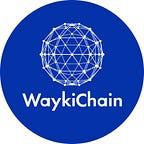From Waykichain’s Perspective: Exploring the Potential of Blockchain Technology in Addressing the Fukushima Nuclear Wastewater Issue
The Fukushima nuclear disaster not only captures global attention but also poses a significant challenge to environmental and ecological safety on a global scale. Recently, the Japanese government’s decision to release treated nuclear wastewater into the ocean has undoubtedly sparked considerable controversy and concern worldwide. In this context of a global and far-reaching issue, Waykichain, a project deeply rooted in blockchain public chain technology for many years, holds the potential to make meaningful contributions in various aspects.
Transparency and credibility are crucial when it comes to the issue of Fukushima’s nuclear wastewater. Public apprehension about radioactive materials largely stems from doubts about the reliability of data released by the Japanese government. To address this, Waykichain can employ its advanced blockchain technology to establish a decentralized database. This database would serve to store and verify real-time key data such as the levels of radioactive materials and discharge volumes from the Fukushima nuclear plant. Through Waykichain’s unique consensus mechanism (Dpos+pBFT), the authenticity and reliability of the data can be assured, thereby enhancing trust among the public and international organizations.
Furthermore, Waykichain’s globally distributed community provides a natural platform for information sharing and collaboration among multiple nations. Building upon this, Waykichain can automate the execution of international environmental agreements through smart contracts. Moreover, these smart contracts could automatically trigger international emergency response mechanisms when radioactive material levels reach a certain hazardous threshold.
Community mobilization is another key aspect of solving this issue. Through its token system, Waykichain can effectively incentivize community members to participate in environmental monitoring and data verification activities. This not only forms a self-motivating and continuously improving ecosystem but also allows for broader public participation in decision-making processes related to the Fukushima wastewater treatment plan through the Waykichain platform, ensuring fairness and wide social acceptance.
In summary, Waykichain, through its comprehensive advantages in data transparency, cross-border collaboration, and community mobilization, offers a blockchain-based perspective for better addressing the Fukushima nuclear wastewater issue. This not only enhances trust among the public and international organizations but also opens up new possibilities for tackling global environmental and ecological challenges. We believe that, with the power of blockchain technology and community engagement, we have the capability to collectively confront this global challenge.
